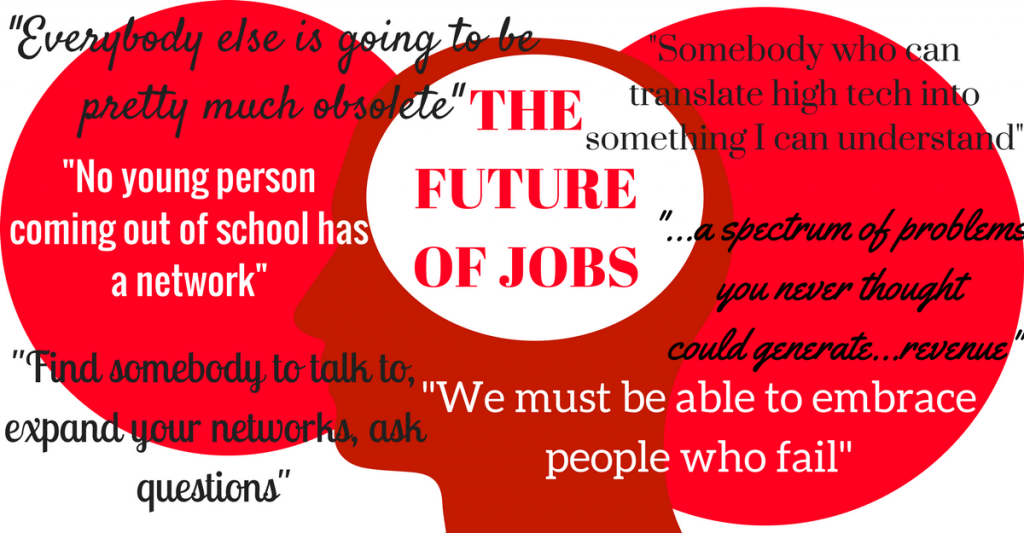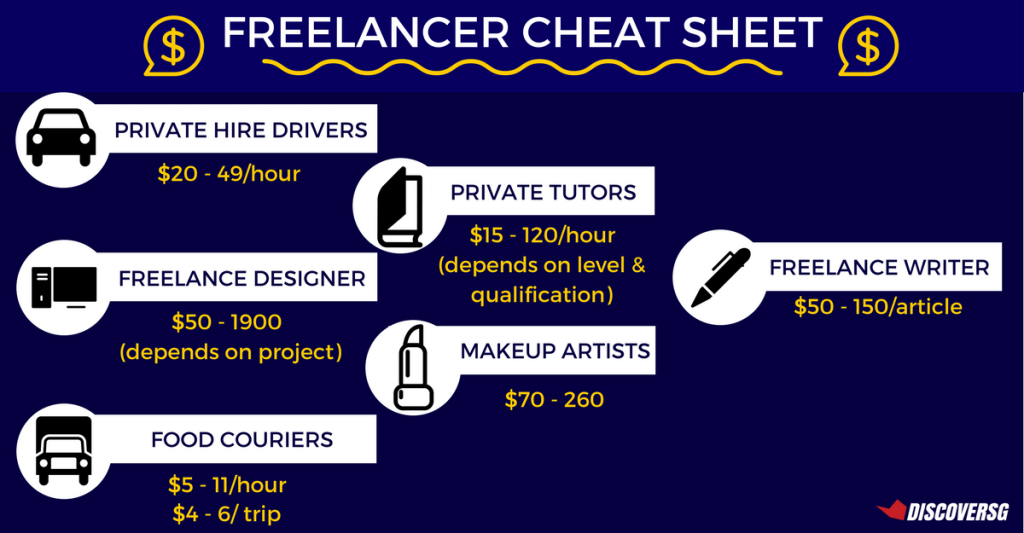These 8 Soundbites Will Have You Rethinking About The ‘Future Of Jobs’ In Singapore

Being a millennial is no easy feat. We have to balance work, play and family all whilst answering life’s toughest question (“what am I doing with my life?!”). Truth of the matter is, most of us have or will go through a quarter-life crisis where we get pretty panic stricken on what we have achieved and where our future lies.
While questions about who we are and if our life is heading in the right direction can be pretty difficult to answer, we picked up some pretty good advice (and a wee bit of fortune telling) when we headed down to the ‘Future Of Jobs Discussion Panel’ earlier in the week.
[caption id="attachment_24796" align="alignnone" width="865"] Source: MP Desmond Choo’s Facebook[/caption]
Source: MP Desmond Choo’s Facebook[/caption]
The session, organised by Young NTUC, was aimed at equipping youth in navigating the job landscape as well as preparing them for the workplace of tomorrow by giving an insight into how it will evolve.
The panel discussion saw Labour chip in on discussions, giving their candid thoughts on how workers need to stay relevant and stay ahead.
[caption id="attachment_24797" align="alignnone" width="1000"] Speakers at ‘Future Of Jobs’ Panel[/caption]
Speakers at ‘Future Of Jobs’ Panel[/caption]
Here are some pretty insightful nuggets of wisdom we picked up:
- “In about 20 years’ time…jobs that are outside of making music or art are going to be computer programs. Everybody else is going to be pretty much obsolete “
– Pulkit Jaiswal
With disruptions abound, the job landscape in Singapore is ever evolving and becoming increasingly tech heavy. It certainly bodes well to mull over future prospects and continually upskill to be able to plug the gaps in the future economy.
If the recent Committee on the Future Economy report is anything to go by, Singapore is looking ahead to chart the next phase of growth and you definitely do not want to get left behind.
- “Even in very tech-heavy companies…what you really want to see from a good employee…is somebody who can translate high technology into something that I can understand”
– MP Desmond Choo
While we can’t argue that jobs in Singapore’s future are going to be more tech heavy, we still have to keep in mind that to climb the ranks at a company you have to establish soft skills.
In his recent Budget Debate speech, Labour MP Desmond Choo quipped that “being nimble and adaptable to change are the names of the new game.” Knowledge can be passed on but honing your soft skills will be what makes you more indispensable to the company.
[caption id="attachment_24798" align="alignnone" width="1024"] Technological advances[/caption]
Technological advances[/caption]
- “In my opinion, what is going to take off in the next 10 to 20 years is this thing I call GRAI. Genetics, robotics and AI technology. I believe that these fields will generate the most amount of revenue“
– Pulkit Jaiswal
No surprises that industries that will likely see a jump in revenue and investment are tech-heavy. With huge leaps in tech advancements such as self-driving cars, we will very likely continue to see tech companies and start-ups breaking new grounds. As Singapore charts the way forward, it is necessary for workers to “keep up” and harness this technology rather than be replaced by it.
- “As a society that promotes entrepreneurship, we must be able to embrace people who fail ”
– MP Baey Yam Keng
Aspiring entrepreneurs are a dime a dozen and while it may sound very tempting to start your own company (your own rules and you answer only to yourself!), it takes a variety of skills, a lot of grit and just a bit of luck. A lot of startups often see themselves shutting its doors even before taking off.
Failure isn’t an easy pill to swallow especially in a competitive country like Singapore. While we are becoming increasingly encouraging of innovation and
entrepreneurship, we also have to be mindful to embrace failure as well.
- “If you’re starting a business… go out of Singapore and work for a startup… When you’re in Singapore… it’s very easy to get trapped solving very specific problems but when you go out… you’ll actually see a spectrum of problems you never thought could generate not only jobs but revenue”
– Pulkit Jaiswal
“Go forth, see the world, conquer the world” so that we can gain experience and exposure – two attributes that MNCs value. These #wisewords were told to participants of the Future Leaders Summit by NTUC’s Labour Chief Chan Chun Sing who encouraged PMEs to gain exposure and a global perspective through working beyond Singapore’s shores.
Doing stints overseas can help broaden one’s horizons and encourage thinking out of the box, giving you an edge in the corporate world.
[caption id="attachment_24800" align="alignnone" width="1024"] Successful entrepreneurs[/caption]
Successful entrepreneurs[/caption]
- “Most of the people who are sitting in a very successful place… were at one point looking for opportunities as well…”
– Pulkit Jaiswal
Every successful person you know of from Bill Gates to Jack Ma have failed at one point or another. Successful entrepreneurs too started from the bottom, looking for investors and opportunities.
Having a successful career may seem like a long shot for someone who has just entered the working world. But, keep in mind that everyone starts from the bottom and that it’s normal to struggle to get to the top.
(Which is what makes achievements taste so sweet!)
- “No young person coming out of school has a network….”
– MP Desmond Choo
While one should always be resourceful in trying to tap on your networks when job hunting, many fresh graduates still require a stepping stone into the corporate world.
This was an issue that prompted Young NTUC to kickstart their Youth Career Network programme to help fresh graduates and first jobbers navigate the working world by linking them up with mentors in the field of work they are thinking of pursuing.
- “All of you out there the young and the not-so-young, go find somebody to talk to, expand your networks, ask questions…and look for mentors”
– MP Amrin Amin
While Amrim Amin joked candidly that the “not-so-young” should also expand their networks and look for mentors, there is some truth to this. And the upcoming Source: Nanyang Polytechnic[/caption]
While such sessions give us a look into the crystal ball at how the workplace of the future is shaping up to be, the onus falls on the individual to proactively seek out opportunities to reskill or upskill as well as expand your networks.
The Labour Movement has also gradually increased its representation of workers and ramped up efforts with targeted initiatives that cater to different worker segments. As such, tapping on this expanded network with the multitude of programmes and one-stop-shop solutions is a great option to help propel you in your career or get a foothold in another industry. Coupled with a forward-looking mindset, you’d be well on your way to being future-ready… come what may.
Also read, Everything You Need To Know Before You Take That ‘Easy Money’ Freelance Job
This article was written in collaboration with the NTUC.
Everything You Need To Know Before You Take That ‘Easy Money’ Freelance Job

Freelance jobs are increasingly popular among youth in Singapore. Since 2015, why you’re taking the freelancing route are all problems faced by freelancers on a daily basis.
We decided to uncover the truth behind 4 popular freelancing jobs here in Singapore and find out the ‘real cost’ of working as a freelancer.
1. Private Hire Drivers
[caption id="attachment_23010" align="alignnone" width="1024"] You have a license and your dad hates to drive. Might as well make some money right?! You’ll get to drive whenever and wherever you want and you’ll be meeting loads of new people (like good looking lads and ladies). You’ll also finally be able to tell your mum you were out late “because I was working!”
You have a license and your dad hates to drive. Might as well make some money right?! You’ll get to drive whenever and wherever you want and you’ll be meeting loads of new people (like good looking lads and ladies). You’ll also finally be able to tell your mum you were out late “because I was working!”
 Youth.sg[/caption]
Youth.sg[/caption]
The Moolah: Expect to get paid from guaranteed fare incentives!
Private-hire drivers are part of a growing gig economy. Gig economy sees such as overtime pay. They also do not receive statutory benefits such as Central Provident Fund contributions from the companies they work for.
So who’s helping private-hire drivers?
[caption id="attachment_23011" align="alignnone" width="1024"] National Private Hire Vehicles Association (NPHVA) inked a partnership with Grab. Facilitating feedback between drivers and Grab, NPHVA seeks to foster stronger partner relationships. Grab also works in conjunction with e2i (Employment and Employability Institute) to provide mature workers with the opportunity to become drivers with Grab.
National Private Hire Vehicles Association (NPHVA) inked a partnership with Grab. Facilitating feedback between drivers and Grab, NPHVA seeks to foster stronger partner relationships. Grab also works in conjunction with e2i (Employment and Employability Institute) to provide mature workers with the opportunity to become drivers with Grab.
2. Food Couriers
[caption id="attachment_23014" align="alignnone" width="1024"] The Benefits: On the move for most of the day, you’ll look super cool wheezing your way through traffic. Work whenever you want and you’ll finally get that extra amount of cash for the new iPhone (there’s always a new one!).
The Benefits: On the move for most of the day, you’ll look super cool wheezing your way through traffic. Work whenever you want and you’ll finally get that extra amount of cash for the new iPhone (there’s always a new one!).
The Shady Side: Seen Premium Rush? While you’re not going to be targeted by a crazed loan shark, you’ll The Moolah: At $5 – 11 an hour and an additional $4 – 6 a trip, you’ll be making an average of $13 – 30 an hour!
3. Freelance Designers
Let’s face it, clients are difficult. You’ll meet the flaky, the rude and the uptight. And if you’re planning to do freelance designing as a full time job, you’ll spend A LOT of time worrying about when’s your next job (and if you’ll be able to afford rent next month).
The Moolah: While you may start out charging at $50 for one-off projects. Once you’ve built your portfolio, a large project (like a website) could fetch you a cool $1,000 (or more)!
4. Freelance Tutors
Under the Employment Act, part-timers without contracts like tutors, aren’t covered by the Manpower Ministry. With online tuition agencies popping up, you might not even see the organization that has hired you!
NTUC Strives To Protect Freelancers
There is an estimated 200,000 freelancers in Singapore. Unlike employed individuals, freelancers here in Singapore are not legally entitled to statutory protection and benefits such as CPF contributions, annual leave, medical leave and rights under labour legislation such as Employment Act and the Work Injury Compensation Act.
[caption id="attachment_23017" align="alignnone" width="1024"] NTUC U Portal[/caption]
NTUC U Portal[/caption]
In its recent Budget 2017 recommendations, NTUC called on the Government to review labour legislation that could potentially help ensure that the interests of freelancers and the self-employed are protected. NTUC is currently focusing on three ways to help protect the interests of freelancers:
- Expanding the role of Tripartite Alliance for Dispute Management (TADM). Freelancers will have access to tripartite networks to resolve disputes.
- Urging the Governments to review how freelancers can currently make CPF contributions and also receive support from the Government in terms of CPF retirement adequacy.
- Urging service buyers to keep manpower costs at advisable rates enabling freelancers access to CPF contributions.
Last year, NTUC’s Freelancers and Self-Employed Unit (U FSE) in collaboration with e2i held a ‘Fair For Freelancers’. Freelancers were given the opportunity to come together and gain new business opportunities. U FSE introduced digital platforms to help connect freelancers with clients for project collaborations.
The Labour Movement continually works closely with the other Tripartite partners – Ministry of Manpower and employers, to create a better working environment for employees. Through Collective Bargaining, Dispute Resolution mechanism and Advocacy, NTUC is giving a voice to the working people of Singapore.
https://www.facebook.com/anghinkee/photos/a.152579238126400.53313.149772861740371/1459249270792717/?type=3&theater
For more information on how the Labour Movement is speaking up for various worker segments, check out Labour Movement’s Budget 2017 Recommendations.
Also Read: True Heroes – 4 Invisible Jobs Singaporeans Take For Granted
4 Jobs That Aren’t As ‘Bulletproof’ As You Once Thought

You’re celebrating finally FINALLY finishing another major stage in your education. Now you’ve decided to continue your studies in Uni but you have NO IDEA what you’re going to study! Don’t worry because I’m pretty sure there are many many of us out there who went through the same process of being confused.
You’ll turn to friends and family who will all have their own opinions on what industry to get into, thinking it’ll be stable (and make you a lot of money). Unfortunately… they might not always be right! Here are 4 career paths that were once “bulletproof” but are not anymore.
1. “Lawyers Are Always Needed And They Make A LOT Of Money!”
Once upon a time, lawyers were (and still are) considered the cream of crop. Only the brightest could get a law degree which is why getting a law degree would guarantee you a spot in a law firm and on the fast track to being a partner (and making SO MUCH money).
What People Think:
[caption id="attachment_17990" align="alignnone" width="1024"]
 . Come 2015, around 100 fresh law graduates e of trainees point towards a “situation can be grim for many aspiring lawyers”.
. Come 2015, around 100 fresh law graduates e of trainees point towards a “situation can be grim for many aspiring lawyers”.
About the The Balance[/caption]
The Balance[/caption]
The housing market has its up and downs but for the most part here in Singapore it’s pretty stable. Selling a few homes a month and you’ll be sitting on a pile of cash!
Reality:
[caption id="attachment_18094" align="alignnone" width="855"] on the disruptions happening in the property market where new digital platforms are being used to handle transactions and cutting out the middlemen.
on the disruptions happening in the property market where new digital platforms are being used to handle transactions and cutting out the middlemen.
At the start of 2016, the 
 According to Spring, a study carried out in 2015 found that only 6 in 10 smaller F&B businesses make it past the five-year mark. This translates to almost half of the 369 cafes registered in 2011 closing down.
According to Spring, a study carried out in 2015 found that only 6 in 10 smaller F&B businesses make it past the five-year mark. This translates to almost half of the 369 cafes registered in 2011 closing down.
If you think you’ll be breaking even the moment customers start walking through the door, that simply isn’t true. Unfortunately, the average business runs at an annual loss of 8% and it takes an average of two and half years to recoup the initial investment.
Smaller F&B businesses make up 85% of the enterprises in the F&B industry yet they only earn 21% of industry revenues.
TL;DR: It isn’t just about good food and service! More than half of small F&B businesses in Singapore close. It’ll generally take you two and a half years to regain your initial investment!
4. “Finance. It’s Where The Money’s At!”
For a long while now, studying finance, economics and banking were considered the smart thing to do. You would land yourself a job right out of school, that’s going to have you working long hours but the payoff would be worth it! You would make your way up the career ladder and be cashing in all the hard work!
What People Think:
You’ll join a bank or financial investment firm, it’ll be hell for awhile you’ll work long hours and you’ll meet clients who are so filthy rich you’ll wish you were them. But then you’ll close a deal and your commission comes in and suddenly it’s all worth it!
Reality:
2016 hasn’t been a good year for financial services. A long-time pillar of growth for Singapore’s economy. The finance sector.
as well as seek flexible hiring solutions such as contract work.
 Connecting Tomorrow’s Unemployed With Tomorrow’s Jobs
Connecting Tomorrow’s Unemployed With Tomorrow’s Jobs
(feature image: The Hard Truths About Migrant Workers In Singapore









